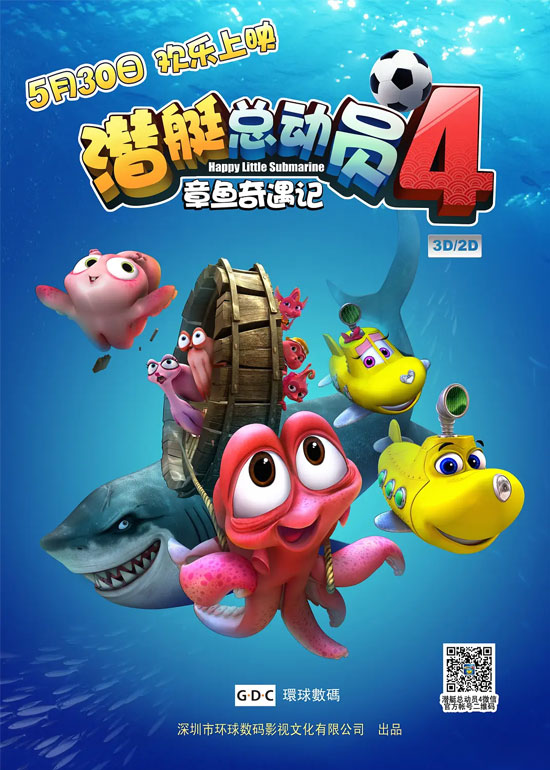Film Name: 潜艇总动员4:章鱼奇遇记 / Happy Little Submarines 4 : Adventure of Octopus

Happy Little Submarines 4 didn’t surprise me like its predecessor did last year. After much thought, I suspect it’s because it lacked novelty. In fact, I understand that for film sequels, the two most headache-inducing words for directors are probably these: novelty. You need new characters, new conflicts, new themes, new settings—but where on earth do you find all that fresh material?
Paul the Octopus and his family are new characters, the World Cup is a new theme, and the father-son dynamic is a new conflict. But are they truly novel enough? Paul the Octopus’s storyline comes at the expense of the film’s original protagonists—the two adorable little submarines. In fact, the film could easily stand without these two “main characters,” and might even work better without them. The World Cup theme, at best, is timely; at worst, it feels contrived. Rehashing a four-year-old gimmick to seem current smacks of forcing novelty where none exists—much like writing a review for “Happy Little Submarines 4” while constantly referencing “The Little Mermaid.” It just misses the mark. As for the family bond theme? That’s so overused it’s become a cliché.
Moreover, films set in the ocean have exploded in popularity in recent years, much like racing-themed movies, becoming two of animation’s biggest “Waterloo” subjects. Since 2003’s Finding Nemo and 2004’s Shark Tale, contemporary animation has fixated on the wonders beneath the waves. The Submarine Adventures spawned two sequels, Submarine Rally four, with scattered entries like Return to the Sea. Even Hayao Miyazaki ventured into the oceanic realm with Ponyo. Overall, aside from Ponyo, depictions of the ocean have become increasingly formulaic. The diversity of marine life and the splendor of underwater environments have grown stale to audiences. Themes of human-ocean relationships and environmental conservation no longer feel fresh, while films exploring underwater societies and family dynamics often seem like mere transplants of terrestrial narratives to the ocean floor.
Therefore, “Happy Little Submarines 4” lacks originality, or rather, it attempted innovation but took the wrong approach, transforming “Qian Ting Zong Dong Yuan” into “Adventure of Octopus.”
Moreover, while the film superficially incorporates numerous elements from real-world society—such as forced demolitions, match-fixing, and cloning—it fails to provide these themes with meaningful resolution. For instance, what stance does the film take on forced demolitions? Is it merely to have the demolition crew become supporters of the octopus family? Similarly, match-fixing represents a dishonest deception that should face moral condemnation from the public at large, not be resolved through a pipe explosion. The explosion only kills the one-eyed shark, not its mastermind boss, and certainly doesn’t reveal the truth to the fans. It merely addresses the surface issue of match-fixing while evading its deeper analysis.
Another example: one of the film’s most powerful moments is when Paul enters a room filled with his clones, all tapping against their glass walls. Yet the film offers no commentary on the escaped clones after the undersea explosion—perhaps to emphasize Paul’s uniqueness. But what impact would this flood of clones have on the ocean, octopus populations, or Paul’s own family? Do these fake Pauls possess any emotions? How will they survive? These ethical questions remain entirely unexplored. The film leaves audiences with the impression that only the real Paul matters, while the clones are mere props. Yet any discussion of cloning should transcend such superficial interpretations.
The film opens with a dream sequence: Paul the octopus playing soccer with remarkable skill. I expected soccer to be his ultimate solution to the final crisis, creating narrative resonance. Instead, Paul abruptly transforms from a soccer player into a fan taking his child to watch games, then into a celebrity predicting soccer matches. This seems utterly unrelated to the initial dream sequence. If the film truly intended to engage with the World Cup, the proper approach would have been to make Paul a football superstar—not merely a predictor—and to have his children fall in love with the sport because of him, rather than fixate on the hypothetical question of whether their father kept his word. After all, the father’s ultimate identity isn’t that of a parent, but of an idol.
Please specify:Anime Phone Cases » Happy Little Submarines 4 : Adventure of Octopus 2014 Animation Film Review: Where has all the novelty gone?